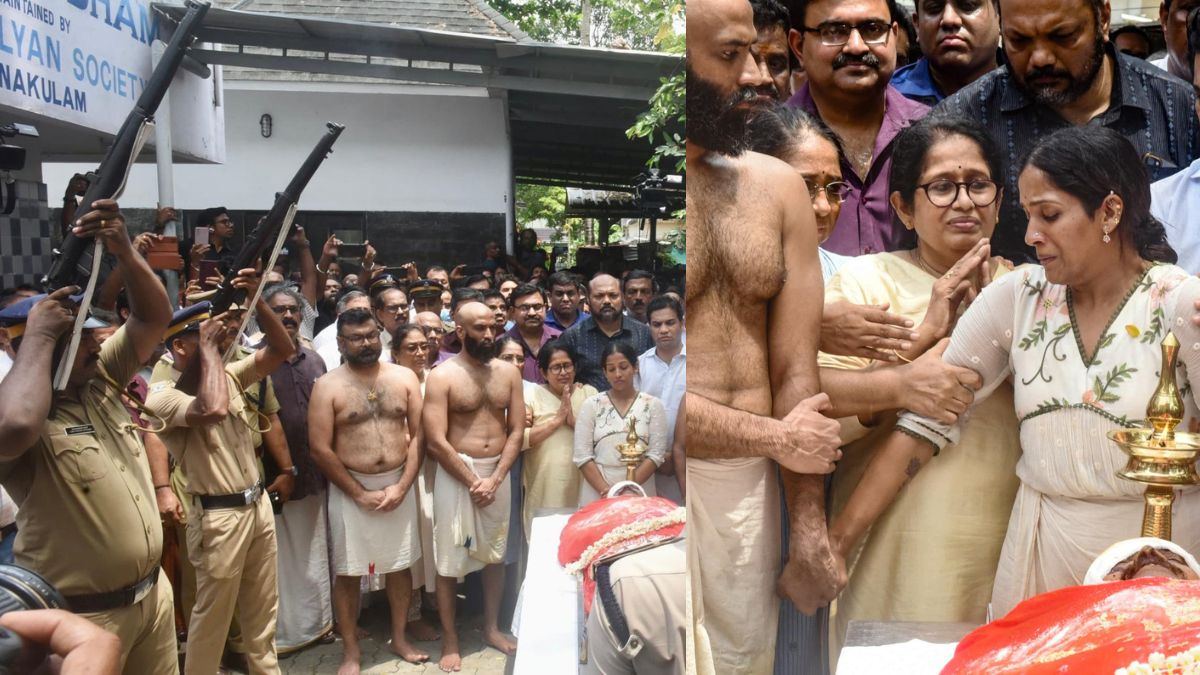The gunshots that tore through Aarati’s heart
 N. Ramachandran's wife Sheela, daughter Aarati and son Aravind during his funeral | EV Sreekumar
N. Ramachandran's wife Sheela, daughter Aarati and son Aravind during his funeral | EV Sreekumar
They came in silence, from every corner of Edappally. Hundreds of men, women, and children drifted into Changampuzha Park in Kochi, Kerala, on Friday morning — not out of curiosity, but out of something deeper. A shared grief. A need to stand beside a neighbour whose life had been stolen far away, in a land of snow and blood called Pahalgam.
N. Ramachandran, 65, a Gulf expatriate and familiar face to many in the neighbourhood, had been travelling with his wife Sheela, daughter Aarati, and young grandchildren when terror struck . The terrorists, in an act of cruel calculation, spared the women and children. Ramachandran was not so lucky.
Having covered many heartbreaks over the years — the funerals of fallen soldiers during the Kargil War, the silent rows of coffins draped in the tricolour — I thought I knew what to expect.
But nothing quite prepared me for this: the sheer rawness of losing someone so ordinary, so recognisable, so woven into the small, everyday rhythms of life.
I had expected a modest crowd. What I saw instead was an ocean of faces.
Schoolchildren stood with solemn, confused eyes. Youngsters clasped flowers in trembling hands. Elderly men and women, who must have passed Ramachandran countless times during their evening strolls at the park, came to say goodbye to a face they knew, if not by name then by presence.
The media swarmed in, a tide of cables and cameras. Wreaths stacked up in messy piles. Politicians elbowed their way forward, each angling for a moment under the floodlights of sorrow.
And in the centre of it all stood a family — broken, but unbowed.
Sheela, barely recovering from a heart surgery, had only learned of her husband's death after landing in Kochi. The news had been kept from her until she was safely home — an act of mercy wrapped in cruelty.
Even in their pain, the family clung to dignity. At Changampuzha Park, they refused to leave Ramachandran’s side, as if physical nearness could somehow delay the inevitable goodbye.
The visual media, relentless, found its way even into the quiet rituals at their modest home nearby. Despite desperate pleas for privacy, video cameras filmed and recorded. The unexpected arrival of Union Minister Suresh Gopi only sharpened the media’s hunger.
From there, the final journey led to Edappally crematorium. Cameras perched on every wall and tree, while behind the scenes, police rehearsed the ceremonial gun salute — a ritual of honour hidden from public view.
At the cremation ground, a sea of humanity stood still, broken only by the murmured prayers and stifled sobs.
Sheela and Aarati remained — two figures of quiet endurance — as Ramachandran’s son, Aravind Menon, lit the pyre, fulfilling the duties no son ever wishes to perform.
Then came the salute.
Three blank shots cracked through the afternoon sky, each one a raw wound tearing into the fragile silence.
Holding my camera, I instinctively flinched. Across the flames, I saw Aarati flinch too — not just in body, but in soul. Every blast seemed to rip her open anew, pulling her back into the terror she had narrowly escaped.
Aravind, standing beside her, reached out and gripped her hand — a simple act of defiance against the universe's cruelty.
When it was over, Aarati, Sheela, and Aravind slipped into a small red car. No words were spoken.
Most of the politicians had long gone, their duty done.
But ordinary people still lingered under the trees, some with their heads bowed, some simply standing — not wanting to leave, not ready to let him go.
I watched the red car roll slowly down the narrow lane, carrying a family’s shattered world away into the grey afternoon.
And still, the park remained.
Many returned to Changampuzha Park for a public remembrance.
The district authorities and townspeople gathered again speaking softly of a man whose death had torn through the fabric of their everyday lives.
A man who once walked among them unnoticed — now remembered by an entire town that refused to forget.
The writer is Picture Editor, Malayala Manorama.
India